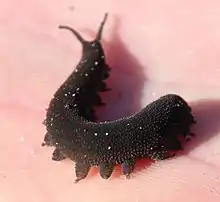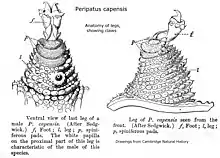| Peripatopsis capensis | |
|---|---|
 | |
| Scientific classification | |
| Domain: | Eukaryota |
| Kingdom: | Animalia |
| Phylum: | Onychophora |
| Family: | Peripatopsidae |
| Genus: | Peripatopsis |
| Species: | P. capensis |
| Binomial name | |
| Peripatopsis capensis (Grube, 1866) | |
| Synonyms | |
| |

Peripatopsis capensis is a species of velvet worm in the Peripatopsidae family.[1] This species has 18 pairs of legs: 17 pregenital leg pairs with claws plus one strongly reduced last pair without claws or spinous pads.[2][3] Females of this species range from 9 mm to 70 mm in length, whereas males range from 6 mm to 54 mm.[4] The native range of this species is limited to the Cape Peninsula of South Africa.[2][5]
Introduced distribution
Outside of its native range in South Africa, this species has also been found on Santa Cruz Island in the Galapagos Islands, thought to be an accidental human-mediated introduction. Santa Cruz Island also has one or more native species of velvet worms in the family Peripatidae.Espinasa, Luis; Garvey, Radha; Espinasa, Jordi; Fratto, Christina; Taylor, Steven; Toulkeridis, Theofilos; Addison, Aaron (2015-01-21). "Cave dwelling Onychophora from a Lava Tube in the Galapagos". Subterranean Biology. 15: 1–10. doi:10.3897/subtbiol.15.8468.</ref>
References
- ↑ Oliveira, I. S.; Hering, L. & Mayer, G. "Updated Onychophora checklist". Onychophora Website. Retrieved 24 November 2016.
- 1 2 McDonald, Dane E.; Ruhberg, Hilke; Daniels, Savel R. (2012-07-05). "Two new Peripatopsis species (Onychophora: Peripatopsidae) from the Western Cape province, South Africa". Zootaxa. 3380 (1): 55–68. doi:10.11646/zootaxa.3380.1.4. ISSN 1175-5334 – via ResearchGate.
- ↑ Purcell, W.F. (1899). "On the South African species of Peripatidae in the collection of the South African Museum". Annals of the South African Museum. 1: 331–351 – via Biodiversity Heritage Library.
- ↑ Monge-Nájera, Julián (1994). "Reproductive trends, habitat type and body characteristcs in velvet worms (Onychophora)". Revista de Biología Tropical: 611–622. ISSN 2215-2075.
- ↑ Oliveira, I. S.; Read, V. M. S. J.; Mayer, G. (2012). "A world checklist of Onychophora (velvet worms), with notes on nomenclature and status of names". ZooKeys (211): 1–70. doi:10.3897/zookeys.211.3463. PMC 3426840. PMID 22930648.
Further reading
- Camatini, M.; Franci, E.; Saita, A. (1979). "Ultrastructural investigation of spermiogenesis in Peripatopsis-capensis (Onychophora)". Journal of Morphology. 159 (1): 29–47. doi:10.1002/jmor.1051590104. PMID 30213150. S2CID 52269962.
- McDonald, D. E.; Daniels, S. R. (2012). "Phylogeography of the Cape velvet worm (Onychophora: Peripatopsis capensis) reveals the impact of Pliocene/Pleistocene climatic oscillations on Afromontane forest in the Western Cape, South Africa". Journal of Evolutionary Biology. 25 (5): 824–835. doi:10.1111/j.1420-9101.2012.02482.x. PMID 22409213.